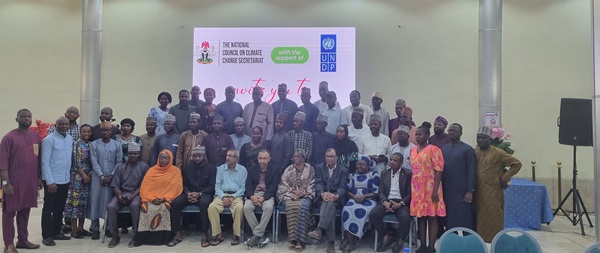
The National Council on Climate Change Secretariat (NCCCS), with support from the United Nations Development Programme (UNDP), has launched a multisectoral stakeholder engagement to review Nigeria’s Nationally Determined Contributions (NDC).
Nigeria first submitted its NDC in 2015 under the Paris Agreement, pledging to reduce greenhouse gas (GHG) emissions by 20 per cent unconditionally and 45 per cent conditionally by 2030, based on business-as-usual projections. In 2021, the country revised its NDC, reaffirming the 20 per cent unconditional target and raising the conditional target to 47 per cent.
Under the Paris Agreement, each party must update and resubmit its NDC every five years. Nigeria’s next submission is due by February 2025.
In preparation, the Nigerian government, through the NCCCS and with support from UNDP under the Climate Promise 3.0 Initiative, convened a stakeholder meeting to engage representatives at national and subnational levels. The forum aims to collect and analyse relevant data, assess progress under NDC 2.0 and review recent development plans to inform the next update.
Speaking at the stakeholder engagement session in Abuja, UNDP’s lead consultant on NDCs, Rasack Nayamuth said Nigeria’s third NDC (NDC 3.0) would align with the Paris Agreement and accelerate progress toward achieving net-zero emissions by 2060. He noted that the updated framework would be supported by Biennial Transparency Reports (BTRs) to guide climate action with improved data tracking and reporting.
NDCs are national pledges outlining specific strategies to cut GHG emissions and adapt to climate change. The BTRs serve as progress reviews, evaluating how effectively countries are implementing their commitments.
Nayamuth acknowledged that Nigeria’s first Biennial Transparency Report (BTR1), submitted in December 2024, encountered major challenges, especially regarding incomplete data and reporting gaps. These shortfalls made it difficult to evaluate actual progress in critical areas such as renewable energy deployment, afforestation, climate-smart agriculture and overall emissions reduction.
“Accurate and comprehensive data is essential for assessing climate action and ensuring we are on track to meet our goals,” Nayamuth stated. He added that data collection for the second Biennial Transparency Report (BTR2) is already underway and will inform the development of NDC 3.0.
He noted that only 18 of Nigeria’s 36 states responded to the BTR1 data requests, highlighting the urgent need for stronger participation from state governments. “We need robust, quantifiable indicators to track progress on mitigation and adaptation measures. The absence of such data weakens the foundation for effective climate planning,” he added.
To address these issues, the ongoing review process will focus on retrieving missing data, strengthening quality control measures and fostering broader inclusion across all stakeholder levels. Nayamuth emphasised that the success of NDC 3.0 depends on collaborative efforts involving government agencies, state institutions, civil society actors and international development partners.
Speaking at the same event, Nigeria’s NDC team lead, Amudi Chioma said the country aims to make NDC 3.0 more ambitious than its predecessors. “We are exploring the possibility of expanding the number of sectors covered in the next NDC and aligning it with new policies and recent developments,” she said.
Chioma emphasised that participants at the workshop are expected to provide sector-specific data, updates on ongoing initiatives and details of climate-related programmes that would help shape the final NDC document. According to her, the end goal is to produce a data-driven and inclusive NDC that reflects Nigeria’s strong commitment to emission reductions and climate resilience.
With a clearer roadmap and enhanced transparency mechanisms, she said, Nigeria is positioning itself to remain on track toward the 2060 net-zero emissions target.
In a separate interview with Science Nigeria, Umar Anka, director of climate change at the Ministry of Environment and Climate Change in Kano, stressed that Nigeria’s NDCs are a strategic tool for strengthening both mitigation and adaptation responses to the increasing impacts of climate change.
Anka made the remarks during a consultation and data collection workshop held as part of preparations for NDC 3.0. He said government priorities should centre on clean energy, sustainable production systems and low-emission practices that address key sources of greenhouse gases. According to him, reviewing the NDCs is essential for increasing national climate ambition and ensuring efforts are in line with global targets.
Looking back at NDC 2.0, Anka noted that the National Council on Climate Change adopted an inclusive approach by engaging diverse stakeholders from different sectors and regions. He praised the collaboration between the UNDP and the NCCCS in coordinating this process and for identifying critical voices to guide the NDC update.
Also contributing to the discussions, deputy director for national and international partnerships–education support services at the Federal Ministry of Education, Uche Onwuama, highlighted the pivotal role of education in advancing Nigeria’s climate goals. She argued that increasing public awareness and educating citizens, particularly at the grassroots, about energy consumption and climate-conscious behaviors is vital to achieving the targets under the Paris Agreement.
“We must focus on educating people on what they should do and what they must avoid, so we can collectively meet our climate obligations,” she said.
Deputy director of biodiversity conservation at the Borno State Environmental Protection Agency, Yakubu Inuwa said Nigeria’s emissions continue to contribute significantly to climate-related challenges. He called for urgent, long-term action to monitor and reduce emissions from all sectors, while simultaneously improving overall environmental quality through comprehensive interventions.
“These interventions should address public health, afforestation and sustainable management of terrestrial, marine and underwater resources,” Inuwa stated.
He added that local stakeholders must be actively involved at every stage of climate policy formulation. Their insights and community-level data, he said, are essential to crafting effective, evidence-based reports and policies that are grounded in the realities facing people on the frontlines of climate impacts.
As the review process for NDC 3.0 gathers momentum, Nigeria is leaning heavily on data, collaboration and transparency to shape a credible, actionable plan that will not only meet international expectations but also protect future generations.

